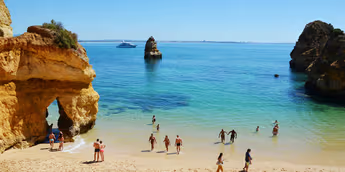These 6 beaches are so dirty that swimming in them can send you to the hospital

You should think twice before surrendering to the attraction of these beaches.
Summer is just around the corner and many people plan to spend it somewhere on the beach.
But for some, the disappointment is enormous when, upon reaching their destination, they realise that the water is too dirty for swimming.
The approaching summer season prompted the British newspaper, The Telegraph, to take a closer look at European beaches in terms of their cleanliness (or pollution).
These 6 beaches are very dirty
Based on official data from the European Environment Agency, which monitors bathing water quality in over 21,000 location, the dirtiest beaches in Europe were identified.
1. Plage de la Gravette, Antibes, France
Although the vast majority of beaches on the French Riviera have “excellent” water quality according to the European Environment Agency, Plage de la Gravette is still one of the dirtiest beaches in Europe. This is mainly due to the fact that the water here is surrounded by rock walls and therefore cannot circulate well.
In June 2023, swimming had to be banned because the water contained a very high percentage of enterococci. These bacteria are usually found mainly in sewage. Oddly enough, this does not affect the popularity of the beach.
2. Playa del Forum, Barcelona, Spain
Despite the nearby sewage treatment plant and waste incinerator, Playa del Forum on the outskirts of Barcelona is a popular swimming spot for locals and tourists alike. However, the European Environment Agency has been calling for the beach to be closed due to poor water quality for four years – so far to no avail. According to the Catalans, there is no reason for this.
3. Pellaro Lume, Reggio Calabria, Italy
Pellaro is the southernmost district of the commune of Reggio Calabria in southern Italy, a bustling port city and an important transport hub in Sicily. The European Environment Agency classifies the water quality on seven beaches there, including the popular Pellaro Lume, as “poor.”
An infection caused by fecal contamination caused confusion among bathers in 2019, according to the Telegraph.
4. Camilo Beach, Algarve, Portugal
In 2020, a red flag was raised due to E. coli bacteria and swimming was banned in Camilo on the southern coast of Portugal. Since then, water quality in Portugal has not improved.
In Praya de Camilo, this is mainly due to the proximity of the city of Lagos and the uncontrolled discharge of sewage there. Oddly enough, this beach is still considered an insider’s tip by many tourists, even though it is one of the dirtiest beaches in Europe.
5. Saint-Michel-en-Grève, Brittany, France
For decades, many of Brittany’s picturesque beaches have been infested with green algae – including the beach at Saint-Michel-en-Grève. The presence of nitrates in the water causes these algae to release hydrogen sulfide as they decompose. This toxic gas can cause headaches, nausea and eye irritation.
According to The Standard, several human and animal deaths in the region have been linked to this gas. For this reason, the water quality of the beach is consistently classified as “poor” as of 2021. It is therefore included in the list of the dirtiest beaches in Europe.
6. Lido Olimpo, Sicily, Italy
While Palermo is now considered a burgeoning tourist destination, the water quality on the city’s beaches has deteriorated significantly.
Over the past five years, several sections of the beach have suffered flooding, and Lido Olimpo beach has even been marked as “poor” by the European Environment Agency, earning it a place on the list of the dirtiest beaches in Europe.
Palermo’s mayor often banned bathing because of fecal bacteria in sewage and possible groundwater contamination from landfills.
In the meantime, sewage systems were reorganised and beaches were cleaned. However, it will still take some time before water quality improves.




